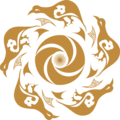No wonder the surviving samples of antique footwear occupy a worthy place in museum exhibitions, along with jewellery, artistic embroidery and noble patterns of ancient ceramics.
The shoes of the master were made of various types of leather, which the artisans charmgar-kunchilar crafted from sheep (charm), goat (kairok, buzi), ox (bulgar) and other skins. The leather was coloured in different colours.
Shepherds in the distant pastures of the mountain wore wooden shoes on three legs – tovuldirok. Tovuldirok were worn at home in rainy weather as well. They were put on either barefoot, bedding insoles or straw, or ichigi teri makhsi sewn from sheep skin with fur covering the calves, or on leather ichigi makhsi. While working in the field, they were wearing “khom kaush” stitched from raw cow or horse skin.
You can learn more about the topic in the book-album "The Collection of the State Museum of the History of Uzbekistan" (Volume XXVII) in the series "The Cultural Legacy of Uzbekistan".
The main sponsor of the project is the oilfield services company Eriell-Group.
